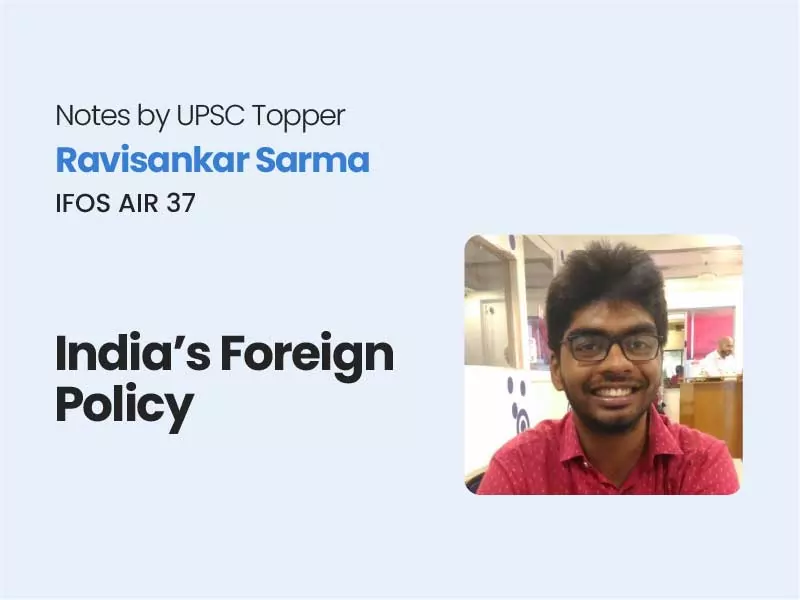
India’s Foreign Policy and Associated Factors
Para Diplomacy
Para Diplomacy refers to international relations conducted by subnational or regional governments with a view to promoting their own interest. The increasing role of states in India’s foreign relation entails both roadblocks and opportunities for India as a nation.
Relevance
- Trade Ties: States and cities of India being producers and consumers of various goods and services are central to developing trade based ties. Tripura’s setting up of border Haats and Punjab’s push for an additional route to the Wagah indicate the willingness of states along these lines
- Spice trade of Kerala with Srilanka, South-East Asia and Europe
- Border States: The sharing of trans-boundary resources and collective security need the participation of the state government before concluding an agreement. Thus, the state governments play a vital role in ensuring or disturbing good relations between India and her neighbours
- The disruptive role of West Bengal in Teesta river water sharing agreement
- Ethnic Ties: India’s rich ethnic diversity enables it to build a cultural bond with foreign nations. The visit by the Canadian Prime Minister to Harminder Sahib and discussions with the Punjab government are all illustrative of the increasing role of states in fostering culture. The role of the Tamil Nadu government in Sri Lanka’s ethnic conflict between Tamil and Sinhalese
- State Diaspora: Significant number of state populations migrate to preferred nations. They serve as a pressure group and also as a bonding factor in India’s relationship. They bring remittances to the country enabling growth and prosperity
- Kerala’s large emigrant population to Middle East
- Investment: Several states in an era of competitive federalism is competing for foreign investments that can serve as the bedrock for better inter-country relations
- Gujarat’s liberalisation of laws and the launch of GIFT City for foreign investment
- Telangana’s holding of the Global Entrepreneurship summit with the U.S as partner
- Climate Change: In light of increased green house gas emissions, it is pertinent that a bottom up approach that converges with the Paris INDC targets is adopted. In this light engagement of states with global subnational governments is most relevant
- Under 2 coalition of subnational governments to achieve net zero carbon emission by 2050 has Telangana and Chhattisgarh as its members
- Enhanced Good will: Several state government initiatives in India have garnered the appreciation of the international community. This has increased India’s soft power as a promoter of good will and prosperity
- Kanyashree Prakalpa received UN acclaim
Municipal Diplomacy: The cities that produce the highest share of India’s GDP holds the key to attracting foreign investment, producing and consuming for trade. Cities around the world can share knowledge to tackle common problems of pollution, transportation, waste management, housing and water crisis.
Eg: Sister cities of Bangalore and Beijing
- State Diaspora: Significant number of state populations migrate to preferred nations. They serve as a pressure group and also as a bonding factor in India’s relationship. They bring remittances to the country enabling growth and prosperity
- Kerala’s large emigrant population to Middle East
- Investment: Several states in an era of competitive federalism is competing for foreign investments that can serve as the bedrock for better inter-country relations
- Gujarat’s liberalisation of laws and the launch of GIFT City for foreign investment
- Telangana’s holding of the Global Entrepreneurship summit with the U.S as partner
- Climate Change: In light of increased green house gas emissions, it is pertinent that a bottom up approach that converges with the Paris INDC targets is adopted. In this light engagement of states with global subnational governments is most relevant
- Under 2 coalition of subnational governments to achieve net zero carbon emission by 2050 has Telangana and Chhattisgarh as its members
- Enhanced Good will: Several state government initiatives in India have garnered the appreciation of the international community. This has increased India’s soft power as a promoter of good will and prosperity
- Kanyashree Prakalpa received UN acclaim
Municipal Diplomacy: The cities that produce the highest share of India’s GDP holds the key to attracting foreign investment, producing and consuming for trade. Cities around the world can share knowledge to tackle common problems of pollution, transportation, waste management, housing and water crisis.
Eg: Sister cities of Bangalore and Beijing
Read Full GS Notes
Conclusion
While New Delhi needs to adopt a firm stand on matters of core national interest, it also needs to give state governments greater freedom to establish cross border cultural and economic linkages conducive for the nation. Such a balanced policy fosters marriage between cooperative federalism and collaborative sub-regional cooperation.
Key Words
Panchasheel
1.Idealistic Phase
- Template for Peaceful Relations: Gujaral Doctrine
Non-Alignment
- Strategic Autonomy
- South-South Cooperation
Read Also World Trade Organization
Enroll today with the best civils service academy and take your first step towards your Civils journey. Feel free to reach out to us for any inquiries, collaborations, or support. We’re here to help.

